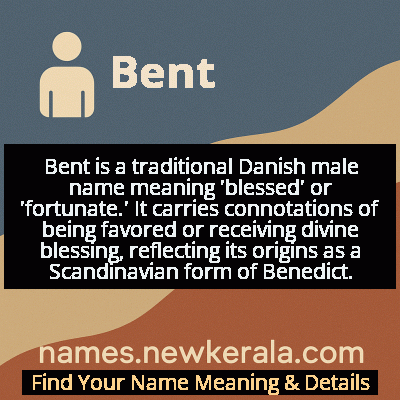Bent Name Meaning & Details
Origin, Popularity, Numerology Analysis & Name Meaning of Bent
Discover the origin, meaning, and cultural significance of the name BENT. Delve into its historical roots and explore the lasting impact it has had on communities and traditions.
Name
Bent
Gender
Male
Origin
Danish
Lucky Number
5
Meaning of the Name - Bent
Bent is a traditional Danish male name meaning 'blessed' or 'fortunate.' It carries connotations of being favored or receiving divine blessing, reflecting its origins as a Scandinavian form of Benedict.
Bent - Complete Numerology Analysis
Your Numerology Number
Based on Pythagorean Numerology System
Ruling Planet
Mercury
Positive Nature
Adventurous, dynamic, curious, and social.
Negative Traits
Restless, impatient, inconsistent, prone to indulgence.
Lucky Colours
Green, white.
Lucky Days
Wednesday.
Lucky Stones
Emerald.
Harmony Numbers
1, 3, 9.
Best Suited Professions
Sales, marketing, travel, entertainment.
What People Like About You
Versatility, charisma, adventurous spirit.
Famous People Named Bent
Bent Larsen
Chess Grandmaster
One of the strongest non-Soviet chess players of the 1960s-1970s
Bent Fabricius-Bjerre
Composer and Pianist
Grammy Award winner for instrumental hit 'Alley Cat' in 1963
Bent Skovmand
Plant Geneticist
Leading wheat breeder who established the Nordic Gene Bank
Bent Christensen
Footballer and Manager
Successful Danish footballer and respected coach
Name Variations & International Equivalents
Click on blue names to explore their detailed meanings. Gray names with will be available soon.
Cultural & Historical Significance
Extended Personality Analysis
People named Bent are typically characterized by their reliability, practical wisdom, and strong sense of duty. They embody the Scandinavian ideal of 'Janteloven'—the law of Jante—which emphasizes humility, community, and not considering oneself superior to others. Bents are often perceived as steady, patient individuals who approach life with methodical care rather than impulsive action. Their strength lies in their consistency and loyalty, making them trusted friends and colleagues who follow through on commitments. While they may not seek the spotlight, they often provide the stable foundation that allows others to flourish. This combination of practicality, reliability, and quiet competence makes Bents particularly valued in roles requiring long-term commitment and careful stewardship, whether in family life, community leadership, or professional settings.
Modern Usage & Popularity
In contemporary naming practices, Bent has transitioned from a popular choice to a more traditional, somewhat dated name that carries nostalgic value. While it rarely appears on current Danish baby name charts, it maintains cultural recognition and occasional use, particularly among families seeking to honor grandfathers or preserve Danish naming traditions. The name's decline reflects broader shifts toward international and modern names, but it hasn't disappeared entirely due to its strong cultural roots. Outside Denmark, Bent remains uncommon except in Scandinavian immigrant communities, where it serves as a marker of cultural heritage. Some parents are rediscovering Bent as a distinctive alternative to more common names, appreciating its simplicity, cultural authenticity, and the values it represents in an increasingly globalized world.
Symbolic & Spiritual Meanings
Symbolically, Bent represents the virtues of stability, gratitude, and cultural rootedness. The name's meaning of 'blessed' extends beyond religious connotations to symbolize an appreciation for life's fundamental blessings—health, family, community, and meaningful work. It evokes the image of someone who builds lasting value through consistent effort rather than fleeting achievements, much like the gradual formation of Denmark's cultural landscape. The name also carries agricultural symbolism, connecting to Denmark's farming heritage and the idea of being firmly planted in one's values and traditions. In a broader sense, Bent symbolizes the Scandinavian social model—pragmatic, egalitarian, and community-focused—making it not just a personal name but a representation of cultural ideals that have shaped Scandinavian society for generations.

